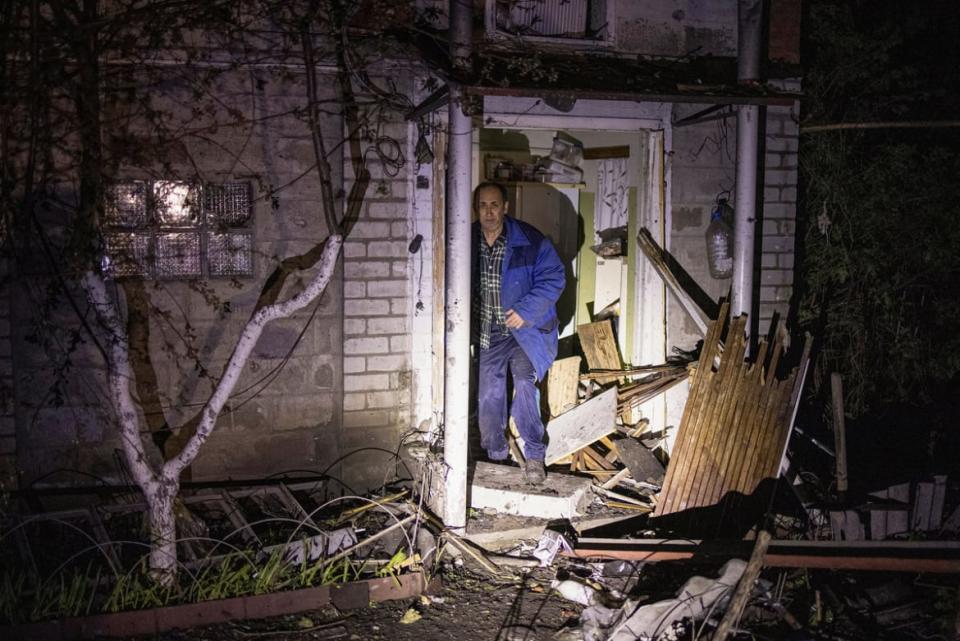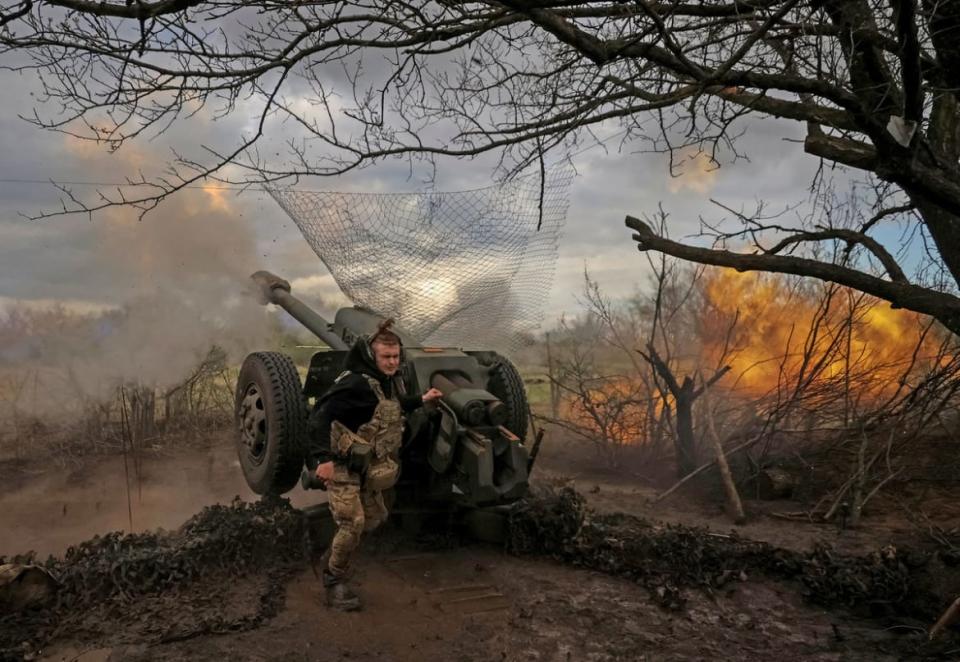Top-Tier Criminals Pivot to Secretly Fight Against Putin

- Oops!Something went wrong.Please try again later.
KHARKIV, Ukraine—Vladimir Putin’s full-scale invasion has severed ties between the once interchangeable underworlds of Russia and Ukraine. Now, some of Ukraine’s organized crime groups are working against their former allies, creating a new phenomenon of “patriotic criminals.”
These new wartime activities range from delivering aid and stopping crime to cyberwarfare, according to organized crime experts and members of the Ukrainian underworld interviewed by The Daily Beast.
Requesting anonymity, a member of one of Kharkiv’s criminal families sat down with The Daily Beast at an Irish pub in early March to discuss how his role has changed since the beginning of the war.
The pub, for the most part, sits vacant. Just one other table of customers is nearby, and Charlie Puth’s “Attention” blares from the speakers. The gangster orders three Americanos for the table, waiting until the server has come and gone to speak.
“Now we help disabled people with diapers, things, food, wheelchairs, medicines. Our mafia in Europe finds business partners. They negotiate, buy and pay us for humanitarian aid for people in need. We went to Saltovka on our own and brought help,” he said. “The rich mafia gave money for this. I have a wife, a daughter. It changed my life. I want to do more good. I did a lot of evil.”
The Mafia Ruling Ukraine’s Mobs
Organized crime has plagued Ukraine since the country gained independence from the Soviet Union in 1991. Until Feb. 24 last year, when Vladimir Putin launched his invasion, there was no differentiation between Russian and Ukrainian organized crime and the two worked in tandem to form the strongest criminal ecosystem in Europe, according to a report by Global Initiative Against Organized Crime (GI-TOC), a non-governmental organization that seeks new ways to combat and reduce the effects of organized crime.
“The ecosphere of the Russian organized crime and Ukrainian crime, they were one organism,” Fedir Sydoruk, field coordinator for the GI-TOC, told The Daily Beast. “We can’t be a hundred percent sure because money talks. It can change in six months or a year, especially after the war ends. But right now, what we’re seeing is a split between Ukrainian organized crime and Russian organized crime.”
Saddle up
The split happened in the chaos of the first few weeks of the war. Ukraine was under constant attack, and even criminals began to look for ways out of the country. According to the GI-TOC report, some Ukrainian crime bosses moved abroad to nearby countries like Turkey, Germany, Italy, and Spain, while other high-level criminal actors looked for “weak points”—places they could redirect their criminal operations to avoid the conflict entirely. Romania, Bulgaria, Italy, and France were seen as options where new ventures could begin, despite the war raging on in Ukraine.
Crime bosses abroad looked for ways to grow their reach, starting new ventures and expanding. But inside Ukraine, the war brought on a sense of patriotism, and a need to defend the homeland. As a result, some crime bosses allegedly gave permission for their men to defy the criminal code and support wartime efforts.
“A thief is always out of politics. A criminal who picks up a gun, previously called a thief-in-law when he comes back from war, is subject to death,” Stas Dombrowski, a drug addiction consultant with knowledge of Ukraine’s underworld, told The Daily Beast.

A local resident in a village outside of Kharkiv stands next to his house, which was badly damaged by a Russian missile strike.
“Regardless of whether he went to defend his country or went to attack. No thief-in-law can publicly support one side or another in military conflict. It’s unnatural,” he said.
But, he explained, “there is a human understanding when there is an aggressor, a country that attacks first. There are people who defend themselves. In that respect, they are entitled to express their opinions [on] a personal basis. But they do not have the right to voice an opinion that is about influencing others. They can’t say, ‘I’m on the side of Ukraine.’ The criminal world does not accept a nationality,” he added.
The criminal code, as Dombrowski points out, is to show ambivalence in most aspects of life. Criminals are told to walk past wrongdoings such as robberies or shakedowns, but to try to stop more serious crimes, like murder, creating a fine line between knowing when to speak up and when not to speak up.
Putin Calls in ‘Organized Crime Syndicate’ to Shake Up Failing Army in Ukraine
“What the Russians did is, at the start of the war, we heard a story from several sources that they sent letters, from the crime bosses to Ukrainian jails saying that we forbid you to help the Ukrainian state in any way,” said Sydoruk. “We were told that the thieves-in-law who were in Ukraine found out that this was a fake. And so they issued their own letter saying that Ukraine’s in trouble. And if your conscience tells you that you want to take part in the state’s activities, going to fight for Ukraine, then you can do it. If you want to help Ukraine in any other way, you can do it.”
The Ukrainian criminal who spoke with The Daily Beast last month said that he had applied to serve the army, but “they didn’t take me because I was in prison for a long time.”
Before the war, Ukraine had 250,000 military personnel and that number has now grown to more than a million. According to the GI-TOC, Kyiv is aware of the threat of criminals joining Ukraine’s Armed Forces, and has even blacklisted several known gangsters from joining the military.
According to the criminal, however, some of the younger members of what he refers to as “the mafia” have made their way into the military, sometimes going to the hottest spots of the war.
“Young guys from the mafia go to the army. I have a friend who is a soldier. He is going to Bakhmut tomorrow. He was already at zero position. I have a friend who was in prison, he was released, and now he is a hand-to-hand combat coach. He trains soldiers,” he said.
He holds up his phone to show recent images of him and his family delivering boxes of supplies in the snow in nearby Izium. The town was under Russian occupation for six months, and although its liberation marked a turning point in the war, it also came with the discovery of a mass grave filled with 440 bodies and layers of destruction.

Ukrainian service members fire a howitzer D30 at the front line near the city of Bakhmut.
Works of redemption are echoed in Dombrowski’s post-invasion efforts. A former drug addict of 20 years, Dombrowski now works to stop drug dealers during the war and turn them in to authorities. His campaign awards anyone who turns drug dealers into police with money. Signs advertising the work—like “Catch the Dealer,” with price tags of up to one million hryvnias (roughly $27,000) for the location of drug labs—can be found on the streets of Kyiv.
“My biggest dream right now is rehabilitating warriors with post-traumatic syndrome,” said Dombrowski.
“I remember what it was like when America had problems with soldiers coming back from Vietnam with heroin addiction. I understand that when our guys come back, we need trained counselors like me, not only of what I’ve read but lived. To become peer-to-peer program help. My role is to make sure that as many war veterans as possible are trained here and now in addiction counseling.”
Dnipro, a city that has been plagued by Russian aggression since 2014, is the center of a phone-scamming operation. “Before the war, they targeted mostly citizens in Western countries, scam calls, getting people to finance idiotic stuff or made-up stuff and scamming money. Right now, all of that is targeting Russia,” said Sydoruk.
Out of options
Human trafficking in Ukraine has plagued the country since its formation. Organized crime rings once targeted illegal workers, women, and in some cases, children. According to a 2021 report by the International Organization for Migration (IOM), more than 300,000 Ukrainians have been victims of human trafficking since 1991.
But a lesser-known aspect of the problem is the vulnerability of migrants looking for work in another country. Per the IOM report, every fourth Ukrainian is ready to accept risky job offers abroad or in another settlement, and 54 percent of that group is men.
In the wake of the war, martial law denied men between the ages of 18 and 61 the right to leave Ukraine, should they be needed to fight, leading some to seek help from organized crime entities to escape.
“They’re not all bad. Most have economic reasons to leave because they have families to feed, and the war has destroyed the job market,” said Sydoruk. “There’s just no work, no jobs. You can’t make money anywhere. That’s the main reason for men leaving because they want to feed their families, not because they’re afraid of dying on the front line, although some are.”
Opting for the underworld’s help in escaping Ukraine has created a series of work exploits where men look for the first job option available, only to find it in the hands of the criminals. For organized crime, this work helps them operate their businesses abroad, with some using the men they helped escape as cheap, illegal labor. The result is the quintessential mafia arrangement: If I do this for you, you do this for me.
The role organized crime will play in Ukraine after the war is uncertain. Both Sydoruk and the criminal in Kharkiv agree that some might try to leverage their good work now to get to higher levels of power.
“Organized crime will never disappear. It’s part of life, like everywhere. We’re not a unique country. It’s just that in some regions, organized crime played a more prominent role here in Ukraine. We’ve always been one of the worst countries in Europe for that. But there are other countries worse,” said Sydoruk. “I think they will use this situation to try to get into power. It’ll probably be easier because you can play on the people’s emotions and say, ‘I helped you out. So, vote for me because I helped you out during the war.’ I think they will use this situation to try to get into power.”
But for now, he added, “We have not found any signs of connections between Zelensky and organized crime.”
Get the Daily Beast's biggest scoops and scandals delivered right to your inbox. Sign up now.
Stay informed and gain unlimited access to the Daily Beast's unmatched reporting. Subscribe now.

